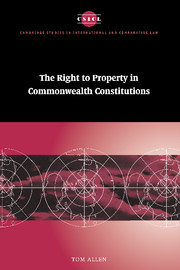Book contents
- Frontmatter
- Contents
- Table of cases
- Acknowledgements
- 1 Introduction
- 2 The right to property at common law
- 3 The development of written rights to property
- 4 Constitutional interpretation
- 5 The meaning of property
- 6 Acquisition and deprivation
- 7 Public purpose
- 8 Compensation
- Bibliography
- Index
- CAMBRIDGE STUDIES IN INTERNATIONAL AND COMPARATIVE LAW
8 - Compensation
Published online by Cambridge University Press: 28 July 2009
- Frontmatter
- Contents
- Table of cases
- Acknowledgements
- 1 Introduction
- 2 The right to property at common law
- 3 The development of written rights to property
- 4 Constitutional interpretation
- 5 The meaning of property
- 6 Acquisition and deprivation
- 7 Public purpose
- 8 Compensation
- Bibliography
- Index
- CAMBRIDGE STUDIES IN INTERNATIONAL AND COMPARATIVE LAW
Summary
Constitutional law and compensation standards
In the vast majority of cases, an owner of property cannot resist expropriation on the grounds that the state intends to act for a constitutionally improper purpose. Hence, most cases focus on the amount and payment of compensation. Most constitutional rights to property state that the owner must receive compensation for expropriated property. Some constitutions specifically state that compensation must be ‘fair’, or ‘just’, or ‘adequate’. The interpretation of these provisions has been guided by the judicial belief that the primary purpose of compensation is to ensure that the owner of property is treated fairly. The protection of public funds may enter into consideration, but the central theme is one of fairness to the individual. This leads most courts to assume that compensation should be no less than the market value of the property that is taken.
This chapter begins by examining the market value principle. An idea as broad as fairness must be set in some sort of context in order to provide a guide to the courts. The assumption that market value must be paid derives from the nineteenth-century English view that compensation should indemnify the owner against the loss of the property. One question that is asked is whether other perspectives on fairness would lead to other compensation standards.
A second context is provided by the compensation standards of the European Convention on Human Rights.
- Type
- Chapter
- Information
- The Right to Property in Commonwealth Constitutions , pp. 223 - 252Publisher: Cambridge University PressPrint publication year: 2000

